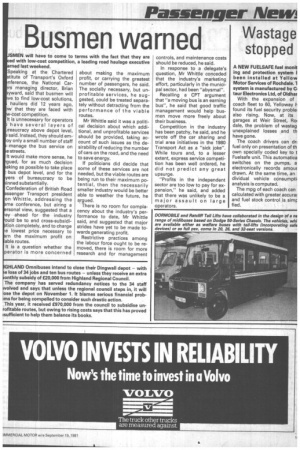Busmen warned
Page 11

If you've noticed an error in this article please click here to report it so we can fix it.
SMEN will have to come to terms With the fact that they are ed with low-cost competition, a leading road haulage executive rned last weekend.
Speaking at the Chartered titute of Transport's Oxford nference, the National Carrs managing director, Brian yward, said that busmen will ve to find low-cost solutions, hauliers did 12 years ago, w that they are faced with cost competition.
It is unnecessary for operators have several layers of reaucracy above depot level, said. Instead, they should emoy only a small number of staff manage the bus service on e streets.
It would make more sense, he gued, for as much decision aking as possible to take place bus depot level, and for the yers of bureaucracy to be inned substantially.
Confederation of British Road ssenger Transport president on Whittle, addressing the me conference, but airing a rsonal view, suggested that a ay ahead for the industry ould be to end cross-subsidition completely, and to charge e lowest price necessary to rn the maximum profit on able routes.
It is a question whether the perator is more concerned about making the maximum profit, or carrying the greatest number of passengers, he said. The socially necessary, but unprofitable services, he suggested, could be treated separately without detracting from the performance of the viable routes.
Mr Whittle said it was a political decision about which additional, and unprofitable services should be provided, taking account of such issues as the desirability of reducing the number of cars on the road, and the need to save energy.
If politicians did decide that some of these services are not needed, but the viable routes are being run to their maximum potential, then the necessarily smaller industry would be better able to weather the future, he argued.
There is no room for complacency about the industry's performance to date, Mr Whittle said, and suggested that major strides have yet to be made towards generating profit.
Restrictive practices among the labour force ought to be removed, there is room for more research and for management controls, and maintenance costs should be reduced, he said.
In response to a delegate's question, Mr Whittle conceded that the industry's marketing effort, particularly in the municipal sector, had been "abysmal".
Recalling a CPT argument that "a moving bus is an earning bus", he said that good traffic management would help busmen move more freely about their business.
Competition in the industry has been patchy, he said, and he wrote off the car sharing and trial area initiatives in the 1980 Transport Act as a "sick joke". While tours and, to a lesser extent, express service competition has been well ordered, he did not predict any great upsurge.
"Profits in the independent sector are too low to pay for expansion," he said, and added that there was unlikely to be a major assault on large operators.








































































